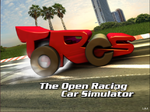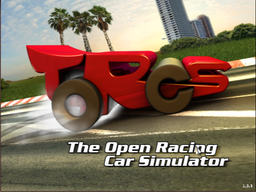TORCS
| TORCS
|
|
|---|---|

|
|

|
|
| Basic data
|
|
| Publishing year | 1997 |
| Current version | 1.3.7 (May 26, 2016) |
| operating system | Linux , FreeBSD , Mac OS , Windows |
| programming language | C ++ |
| category | Racing simulation |
| License | GPL |
| torcs.sourceforge.net | |
TORCS ( T he O pen R acing C ar S imulator ) is a free car racing simulation , available for Linux , FreeBSD , Mac OS X , and Microsoft Windows . The program is implemented in C ++ and is made available under the GNU GPL open source license . TORCS is designed for the development of AI racing drivers, but players can also drive themselves and control a vehicle with the keyboard, mouse or a steering wheel and pedals. The most famous spin-off from Torcs is Speed Dreams. The current version of Speed Dreams is 2.2.1.
Content
- vehicles
The simulator contains models of various high-performance vehicles, Formula 1 and off-road vehicles. They are systematized according to performance class and structure of the drive train . With the help of fan extensions, the scope can be increased as required.
- stretch
Version 1.3.1 contains many different routes in the categories road (street routes ), dirt (rallycross routes) and oval (oval routes). Among other things, there are replicas of the routes from Monza , Suzuka and Adelaide as well as many fictional routes. Many other routes can be obtained as add-ons via the Internet, for example Brands Hatch , Le Mans or the Laguna Seca Raceway . There is also an editor for creating your own routes.
- Robots
The drivers (computer opponents) controlled by the software are referred to as robots within the project . The properties and behavior of a robot are determined by part of the source code . Own robots can be programmed in C or C ++.
development
history
The development of TORCS was started in 1997 by Eric Espié and Christophe Guionneau. At the beginning the simulation was two-dimensional , the name of the project was Racing Car Simulator ( RCS ). RARS (Robot Auto Racing Simulator) was used as inspiration in the beginning. After Espié and Guionneau bought a 3dfx graphics card , they developed the first 3D version of the simulator using OpenGL and renamed the project Open Racing Car Simulator ( ORCS ) (to avoid confusion with the Revision Control System ). After further developments, the project got its current name TORCS . The first version (0.0.15) was published on September 11, 1999. In March 2005 the project was handed over to Bernhard Wymann.
Pending functionality
Apart from maintenance and improvements, a network multiplayer mode, an improved physics engine , better car interior views and the recording of replays and telemetry are planned.
Spin-offs
There are different spin-offs from TORCS , for example Speed Dreams (formerly called TORCS-ng), pyTORCS (formerly called OpenRacing) and GZRacing . Spin-offs take place to achieve goals that are not compatible with TORCS.
reception
Reviews
The Linux Journal mentioned TORCS as the best open source car racing simulation in the issue of October 18, 2007. The options for creating your own vehicles, the realistic vehicle behavior and the graphics were particularly emphasized.
Competitions
The TORCS Racing Board runs competitions for TORCS players on its website. AI racing drivers developed by the players are sent into the race against each other. For this, the AI racers are uploaded to the TORCS Racing Board , the races are then carried out offline and the results are uploaded.
The departments of the Julius Maximilians University of Würzburg and the Polytechnic in Milan hold two further competitions, the Simulated Car Racing Championship and the Demolition Derby Competition , both competitions use modified TORCS versions.
Use in research and teaching
Because of its portability, stability, simplicity, modularity and expandability, TORCS was used in many research projects, for example for the automated determination of vehicle settings, for the verification of vehicle components, for researching applications of neural networks and much more. Since 2008 TORCS has also been used for projects of the IEEE Conference on Computational Intelligence and Games .
gallery
Web links
Individual evidence
- ↑ About TORCS . Retrieved August 16, 2013.
- ↑ - ( Memento of the original from May 17, 2009 in the Internet Archive ) Info: The archive link was inserted automatically and has not yet been checked. Please check the original and archive link according to the instructions and then remove this notice.
- ↑ TORCS story . Retrieved August 16, 2013.
- ↑ TORCS FAQ: "Who develops TORCS?" . Retrieved August 16, 2013.
- ↑ TORCS FAQ: "What are the future plans?" . Retrieved August 16, 2013.
- ↑ Speed Dreams home page . Retrieved August 16, 2013.
- ↑ pyTORCS Wiki . Retrieved August 16, 2013.
- ^ Mike Diehl: Free Games for Linux . In: Linux Journal . Linux Journal. October 18, 2007. Retrieved August 16, 2013.
- ↑ TORCS Racing Board . Retrieved August 16, 2013.
- ^ Simulated Car Racing . Archived from the original on July 4, 2013. Info: The archive link was automatically inserted and has not yet been checked. Please check the original and archive link according to the instructions and then remove this notice. Retrieved August 16, 2013.
- ↑ Automatic adaptation to generated content via car setup optimization in TORCS . Retrieved August 16, 2013.
- ↑ An automotive test-bed for electronic controller unit testing and verification . Retrieved August 16, 2013.
- ↑ Evolving Large-Scale Neural Networks for Vision-Based TORCS (PDF; 2.1 MB) Retrieved August 16, 2013.
- ↑ Google Scholar "torcs car" . Retrieved August 16, 2013.




